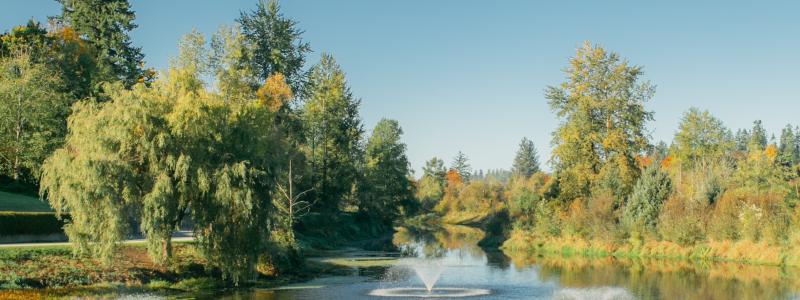A sunset walk at the Langley campus trail beside McMillan Lake sparked conversations about nature, conservation, and literary arts — contributing to an ongoing research project by a team of TWU faculty and students.
In November, a group of faculty researchers and students took a journey into TWU’s Ecosystem Study Area (ESA). The walk was co-hosted by the ConVersing/ConServing research team and the Trinity Western Environmental Club (TWEC) and led by Environmental Studies faculty Karen Steensma, David Clements, and Chris Hall.
The event, Foraging for Stories, brought together conservation and creative literary expression to foster knowledge about the varieties of natural habitats and plant species that exist on the Langley campus.
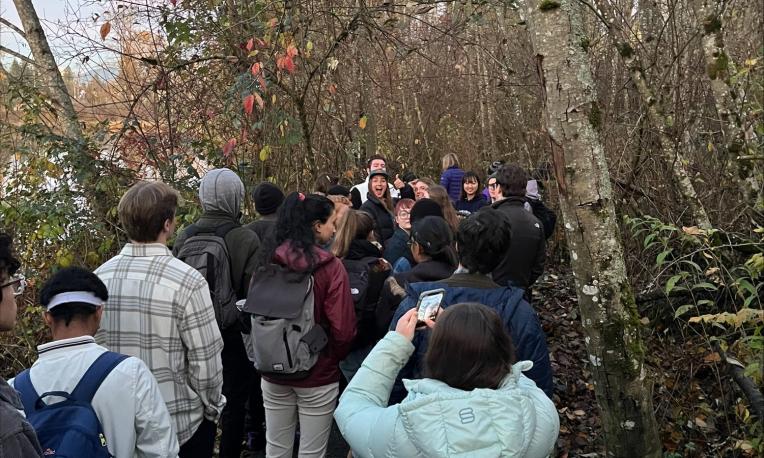
Foraging for knowledge
Walking together around McMillan Lake, students and faculty “foraged” with their eyes and cameras for fungi and lichen, while catching glimpses of other creatures in the area, including waterbirds and a muskrat.
Afterwards, back in the classroom, the group was treated to stories of the ESA told by the Environmental Studies faculty, including the stories of how the area came to be protected from development and how students have discovered, identified, and lovingly inventoried the various species that flourish there, including the endangered Oregon Snail.
“It was wonderful to...sip hot chocolate listening to stories spanning 30 years of sunrises and sunsets on the land we steward, and be grateful for the thousands of years of Indigenous stewardship that had gone before us.”
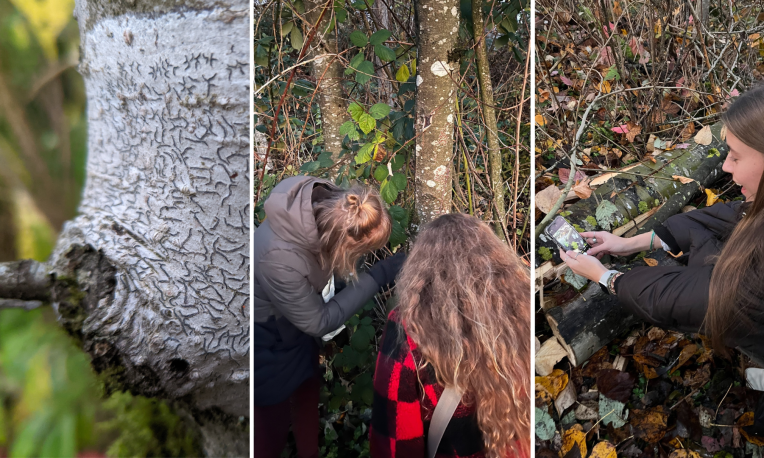
30 years of conservation history at TWU
This event was the second in a ConVersing/ConServing “Foraging for Stories of the ESA” series. The first event featured student participants and undergrad research assistant archivist, Faith Nelson, sharing their research projects and discoveries about the ESA.
Professor of Biology Dr. David Clements says, “Many students have written their stories into the fabric of creation in this special place we call the Ecosystem Study Area, and it was so inspiring for us to share their stories to a new generation of students present at the Foraging for Stories event.”
He adds, “It was wonderful to step into the classroom after a brisk walk in the Ecosystem Study Area beholding the end of the day as the sun went down, and to sip hot chocolate listening to stories spanning 30 years of sunrises and sunsets on the land we steward, and be grateful for the thousands of years of Indigenous stewardship that had gone before us.”
"One of the aims of this project is to help widen the scope of collective memory and deepen gratitude for the gift of this land..."
Creative writing inspired by nature
In addition to exploring the environment and sharing stories, students were provided writing prompts to compose poetry, essays, and reflections based on their experiences. Selections from participants’ creative writing about the ESA will be compiled in a chapter book that will be launched at the Conference on Christianity and Literature, co-hosted by the departments of English and Creative Writing, Environmental Studies, the Faculty of Natural and Applied Sciences, and TWU on May 9-11, 2024.
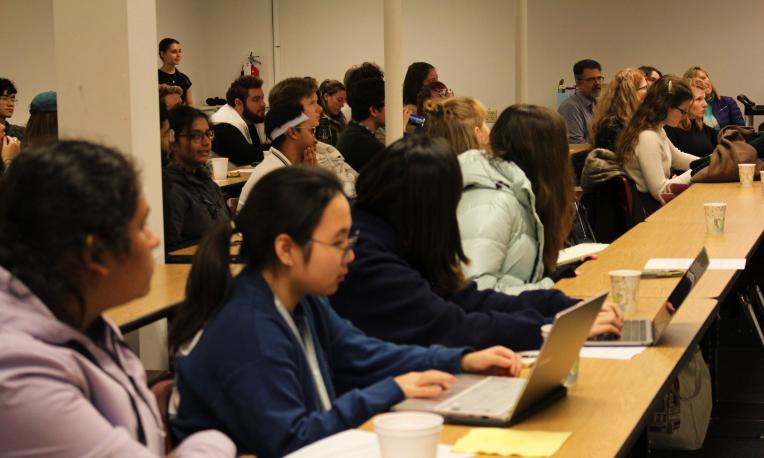
Building collective memory, deepening gratitude
Dr. Katharine Bubel is the principal investigator of the ConVersing/ConServing research project, which bears the subtitle, “Ecopoiesis and Place-Sensitive Knowledge in the TWU Ecosystem Study Area.” She leads this work alongside three other colleagues in the Department of English and Creative Writing. Together they seek to "imaginatively combine environmental science and creative writing to bring together various parts of the natural world into conversation."
Dr. Bubel expands, “One of the aims of this project is to help widen the scope of collective memory and deepen gratitude for the gift of this land. To riff on a popular environmentalist saying, we only care for what we love, and we love what we know. It goes the other way, too: we only really know what we love and care for."
She continues, "Our project, which includes a varied group of creative writing participants, comes alongside environmental science and land management to help foster creation care and understanding of the ESA and TWU campus."
"...We are embodied beings who live not just in abstract time and space, but in storied, envisioned, and beloved places—including our campus land.”
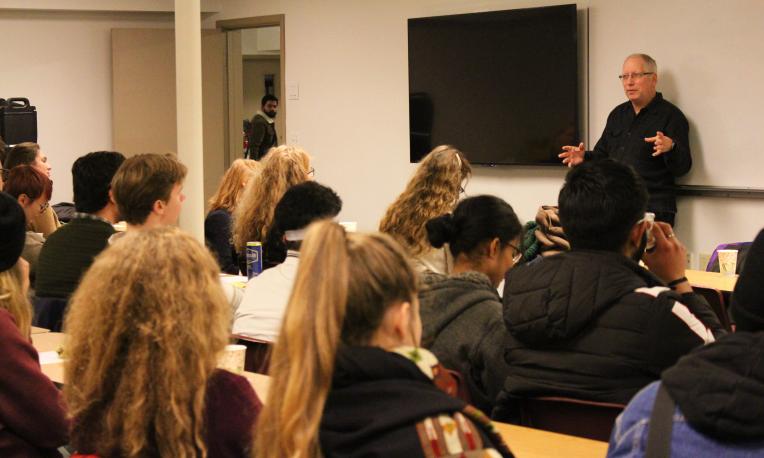
Embodied learning
Moreover, the project blends knowledge and creative thinking with physical spaces. As Dr. Bubel explains, "Our learning takes place! It’s an incarnational principle: we are embodied beings who live not just in abstract time and space, but in storied, envisioned, and beloved places—including our campus land."
On the vision of the ConVersing/ConServing project, Dr. Clements says, “At the end of our proposal to establish the Ecosystem Study Area submitted to the TWU administration in 1998, we wrote: ‘Even the relatively simple act of establishment and designation of an ecosystem reserve, calls attention to its availability, and consequently serves to generate a variety of uses and programs beyond those already in existence—not only in the natural sciences and the creative arts, but in unanticipated areas as well.'”
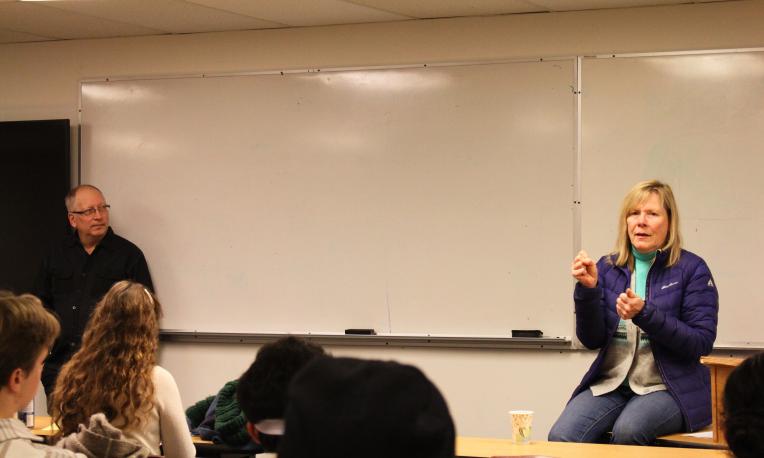
Bringing together science and the creative arts
It was the intent from the start to engage multiple disciplines in the conservation work. Dr. Clement explains, “We have had a vision of how both science and the creative arts could utilize the ESA since the beginning, but never have we had this vision come to such a delightful fruition as we see it now with the ConVersing/ConServing project."
"Bringing together creative writing about nature through our friends in the English Department with the intricacy and beauty of the creation in these lands we steward through scientific study and management makes for a harmonious marriage. God spoke creation into being and created us in His image as creative beings who can produce art that celebrates His creation in ways that science can’t." The team looks forward to more ConVersing/ConServing research project activities in the coming year.
About TWU's Ecosystem Study Area
The Trinity Western University Ecosystem Study Area (ESA) is an area dedicated to the study, preservation, and proper management of the environment. It is a valuable area of diverse and sensitive habitat, containing part of the Salmon River and some tributaries. Learn more at Trinity Western's Ecosystem Study Area.
About Trinity Western University
Founded in 1962, Trinity Western University is a global Christian liberal arts university. We are dedicated to equipping students to discover meaningful connections between career, life, and the needs of the world. Drawing upon the riches of the Christian tradition, seeking to unite faith and reason through teaching and scholarship, Trinity Western University is a degree-granting research institution offering liberal arts and sciences as well as professional schools in business, nursing, education, human kinetics, graduate studies, and arts, media, and culture. It has campuses in Canada in Langley, Richmond, and Ottawa. Learn more at www.twu.ca or follow us on Instagram @trinitywestern, Twitter @TrinityWestern, on Facebook and LinkedIn.
For media inquiries, please contact: media@twu.ca.
Images by Hayleigh Butcher, Kylie Grover, Meijia Geng, and David Clements.

